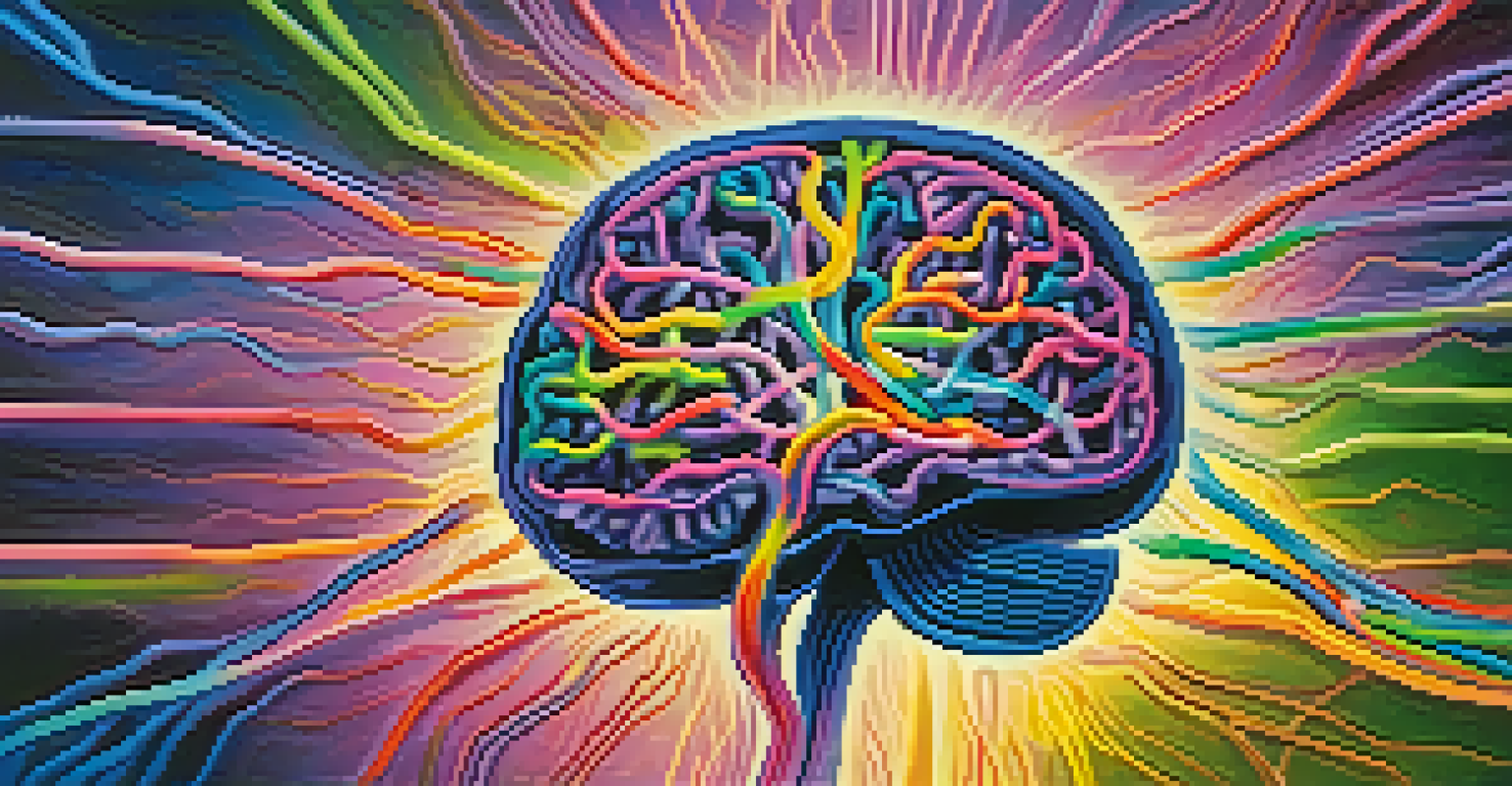Understanding Hallucinogens and Their Impact on Hormonal Balance

What Are Hallucinogens and Their Common Types?
Hallucinogens are substances that alter perception, mood, and various cognitive processes. They're often classified into two main types: classic hallucinogens, like LSD and psilocybin, and dissociative drugs, such as ketamine. Each type interacts uniquely with the brain, creating vivid sensory experiences that can feel very real.
The mind can be a dangerous place, but it can also be a wonderful one. We just have to learn how to navigate it.
The experiences induced by these substances can lead to profound changes in thoughts and emotions. For instance, users might see colors more vibrantly or experience a sense of interconnectedness with nature. While these effects can be enlightening, they also come with risks, particularly concerning mental health.
Understanding hallucinogens is crucial, especially as their use becomes more prevalent in therapeutic settings. Researchers are exploring their potential benefits for conditions like PTSD and depression, but their impacts on bodily systems, particularly hormonal balance, warrant careful consideration.
The Role of Hormones in the Body Explained
Hormones are chemical messengers that play a vital role in regulating many bodily functions, including metabolism, mood, and growth. They travel through the bloodstream to organs and tissues, influencing everything from how we respond to stress to how our bodies use energy. Key hormones include cortisol, serotonin, and adrenaline, each with specific functions.

For example, cortisol, often called the 'stress hormone,' helps control how the body responds to stress and affects metabolism. On the other hand, serotonin is known as the 'feel-good hormone,' impacting mood and happiness. Understanding these hormones is essential to grasp how substances like hallucinogens might influence them.
Hallucinogens Affect Hormones
Hallucinogens can significantly influence hormonal levels, impacting stress responses and emotional states.
When hormonal balance is disrupted, it can lead to various physical and psychological issues, such as anxiety, fatigue, and mood disorders. Thus, exploring how hallucinogens interact with these hormones is critical for both safety and therapeutic efficacy.
How Hallucinogens Affect Hormonal Levels
Research indicates that hallucinogens can influence hormonal levels significantly. For example, substances like psilocybin may alter cortisol production, which can either heighten or dampen stress responses. This modulation can have varying effects on individuals, depending on their mental health status and the context of use.
Your body is a temple, but only if you treat it as one.
In addition to cortisol, hallucinogens might also impact serotonin levels. Since many classic hallucinogens resemble serotonin chemically, they can bind to serotonin receptors, potentially enhancing mood and altering emotional responses. This interaction might explain why some users report feelings of euphoria or profound insight during their experiences.
However, the relationship between hallucinogens and hormonal balance is complex. While some users may experience temporary improvements in mood, others could encounter adverse effects, showcasing the need for more thorough studies to understand these dynamics fully.
Potential Therapeutic Benefits of Hallucinogens
Emerging research suggests that hallucinogens may have therapeutic benefits, particularly in mental health treatment. For instance, studies have shown that substances like ketamine can provide rapid relief for depression, possibly by normalizing hormonal imbalances. This presents an exciting avenue for treatment, especially for those who have not found relief through traditional methods.
Moreover, hallucinogens can foster introspection and emotional healing, helping individuals process traumatic experiences. By potentially regulating hormones associated with stress and mood, these substances could play a role in comprehensive therapeutic approaches.
Therapeutic Potential Exists
Emerging research suggests hallucinogens may offer therapeutic benefits for mental health, particularly in normalizing hormonal imbalances.
Yet, it's essential to approach this topic with caution. While the therapeutic potential is promising, the variability in individual response to hallucinogens means that further research is vital to ensure safety and efficacy.
Risks and Side Effects of Hallucinogen Use
While hallucinogens may offer therapeutic benefits, they also come with risks. Some users may experience negative psychological effects, such as anxiety or paranoia, which can be exacerbated by hormonal fluctuations. For instance, a surge in cortisol during a hallucinogenic trip might lead to an overwhelming sense of fear or panic.
Physical side effects can also occur, including changes in heart rate and blood pressure. These physiological reactions can be influenced by hormonal changes, complicating the overall impact of the drug on the body. Hence, understanding individual health factors is crucial before considering hallucinogen use.
It's essential to approach hallucinogens with caution, particularly concerning their potential to disrupt hormonal balance. Consulting with healthcare professionals can provide valuable guidance for anyone considering their use.
The Importance of Context in Hallucinogen Use
The context in which hallucinogens are consumed can significantly influence their effects on hormonal balance. Factors such as setting, mental state, and dosage play crucial roles in determining whether the experience will be beneficial or harmful. For instance, a supportive environment may enhance positive outcomes, while a stressful or chaotic setting could lead to adverse reactions.
Additionally, individual differences, such as pre-existing mental health conditions or hormonal imbalances, can shape how one reacts to these substances. Understanding these factors is vital for anyone considering the use of hallucinogens for therapeutic purposes, as they can mitigate risks and enhance benefits.
Context Matters for Safety
The effects of hallucinogens are heavily influenced by the context of use, including setting and individual mental health.
Thus, being mindful of context and individual circumstances is essential for safe and effective use of hallucinogens. It underscores the need for a tailored approach, particularly as more people explore these substances in therapeutic settings.
Final Thoughts on Hallucinogens and Hormones
In summary, hallucinogens present a fascinating intersection between mental health and hormonal balance. While they may offer therapeutic potential, particularly in addressing mental health disorders, their effects on hormones can be complex and varied. This duality highlights the necessity for further research to fully understand these interactions.
As we continue to explore the potential benefits and risks of hallucinogens, it's crucial to prioritize safety and informed decision-making. Engaging with healthcare professionals and considering individual contexts can lead to more beneficial outcomes and minimize potential harm.

Ultimately, the conversation about hallucinogens and their impact on hormonal balance is just beginning. As more research unfolds, we may uncover even deeper insights into how these substances could reshape our understanding of mental health and wellness.